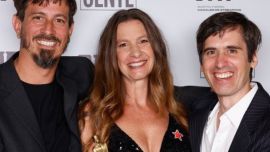Argentina’s leading presidential candidates in the 2023 elections outlined their economic plans to top business leaders this week at an exclusive event in Bariloche, with libertarian lawmaker Javier Milei the talk of the Patagonian city.
The Foro Llao Llao is an annual draw for the bosses of the nation’s top firms, with members of the the so-called ‘círculo rojo’ influential group of businesspeople rubbing shoulders and sharing notes.
The most eagerly awaited speech was undoubtedly Milei, who detailed parts of his dollarisation plan that has been the talk of financiers and banking kingpins in Buenos Aires this week.
In a half-hour address, La Libertad Avanza deputy immediately questioned “whether the peso should continue to exist as a currency" and said he is fully behind dollarisation.
Admitting that some might be “scared” by his proposal, given that Argentina suffers from a surplus of pesos and shortage of dollars, and by his plan to close the Central Bank, Milei said that the “caste is scared” by his plan as it would affect their “interests.”
"There are issues of dollarisation that I notice that not even the economists are clear about," said the 52-year-old. For this reason "the whole debate is invalid,” he continued. “The problem is that people and economists do not understand the nature of the demand for money. And therein lies the problem.”
Milei dismissed criticism as “nonsense” and said there would be “no social cost,” despite dire warnings from analysis about the cost of such a ‘shock’ economic programme. The lawmaker praised the convertibility plan as hugely successful and said he could hold a referendum on the issue.
The economist then vowed to reduce public spending by 13 percent of gross domestic product by eliminating public works projects and tendering them to the private sector. He would also shutter state-owned firms.
After his presentation, he answered questions from doubting business leaders.
Just as many pairs of eyes were on the opposition coalition’s leading candidates. Buenos Aires City Mayor Horacio Rodríguez Larreta and ex-Buenos Aires Province governor María Eugenia Vidal both delivered speeches on Tuesday, although they did not cross paths.
Despite their recent political differences, both outlined broadly similar goals and delivered similar speeches: talking up their candidacies, they underlined the importance of achieving fiscal balance and implementing a comprehensive macroeconomic plan – little surprise given that their teams share the same economists.
Vidal said that rebuilding Argentina would entail everyone working together. “Argentina needs a team of people, beyond who gets to lead,” she declared.
Rodríguez Larreta stressed the importance of opening up the economy to external investment and opportunities and warned business leaders to ignore “unproductive bravado,” though the mayor said he is committed to the deregulation of the economy, eradicating the fiscal deficit, labour reform and the shrinking of the state.
Argentina must “rebuild the independence of the Central Bank” and eliminate currency controls, though not on “the first day.”
In contrast, former security minister Patricia Bullrich said that, should she successfully win the presidential ballot, she would eliminate the cepo on her first day in office. Vowing to deliver “order,” the PRO party hopeful said she would propose a bill of “tax decontamination” and progressively eliminate export duties.
“We will demolish the economic regime of the last 20 years, which drastically reduced incentives to invest, export and create jobs. To do so, we will push for reforms that change economic incentives, restore fiscal solvency and gradually rebuild credibility,” declared Bullrich.
Not all the candidates were so bullish. Unión Cívica Radical (UCR) leader and Jujuy Province Governor Gerardo Morales cautioned that turbulent times lay ahead for whoever took office, warning that the "next government will have to take tough measures."
The most notable absentee from the event was President Alberto Fernández himself, who did not speak or attend the closing lunch.
Though his attendance had been confirmed and a flight scheduled to Bariloche, the government announced that Fernández – who has not officially confirmed his intention to run for re-election – had cancelled his attendance due to a “complicated” agenda.
– TIMES/PERFIL


























Comments